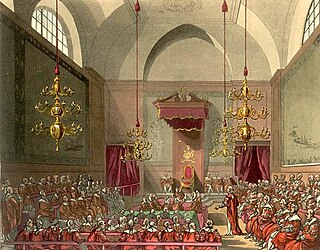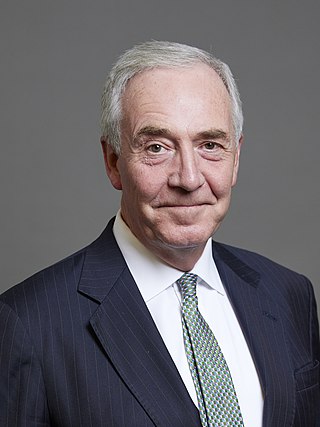Related Research Articles

The House of Lords is the upper house of the Parliament of the United Kingdom. Like the lower house, the House of Commons, it meets in the Palace of Westminster in London, England. One of the oldest institutions in the world, its origins lie in the early 11th century and the emergence of bicameralism in the 13th century.

The Parliament of the United Kingdom of Great Britain and Northern Ireland is the supreme legislative body of the United Kingdom, and may also legislate for the Crown Dependencies and the British Overseas Territories. It meets at the Palace of Westminster in London. Parliament possesses legislative supremacy and thereby holds ultimate power over all other political bodies in the United Kingdom and the Overseas Territories. While Parliament is bicameral, it has three parts: the sovereign, the House of Lords, and the House of Commons. The three parts acting together to legislate may be described as the King-in-Parliament. The Crown normally acts on the advice of the prime minister, and the powers of the House of Lords are limited to only delaying legislation.

The legislatures of the United Kingdom are derived from a number of different sources. The Parliament of the United Kingdom is the supreme legislative body for the United Kingdom and the British overseas territories with Scotland, Wales and Northern Ireland each having their own devolved legislatures. Each of the three major jurisdictions of the United Kingdom has its own laws and legal system.
An Order-in-Council is a type of legislation in many countries, especially the Commonwealth realms. In the United Kingdom, this legislation is formally made in the name of the monarch by and with the advice and consent of the Privy Council (King-in-Council), but in other countries the terminology may vary. Orders-in-Council are distinct from Orders of Council, which are made in the name of the Council without sovereign approval.

A statutory instrument (SI) is the principal form in which delegated legislation is made in Great Britain.
A joint committee is a committee made up of members of the two chambers of a bicameral legislature. In other contexts, it refers to a committee with members from more than one organization.
Delegated legislation or secondary legislation in the United Kingdom is law that is not enacted by a legislative assembly such as the UK Parliament, but made by a government minister, a delegated person or an authorised body under powers given to them by an Act of Parliament.

The reform of the House of Lords, the upper house of the Parliament of the United Kingdom, has been a topic of discussion in UK politics for more than a century. Multiple governments have attempted reform, beginning with the introduction of the Parliament Act 1911 by the incumbent Liberal Government. When the Labour Party came to power in the 1997 general election, the Blair government passed the House of Lords Act 1999. On 7 November 2001 the government undertook a public consultation. This helped to create a public debate on the issue of Lords reform, with 1,101 consultation responses and numerous debates in Parliament and the media. However, no consensus on the future of the upper chamber emerged.

The Legislative and Regulatory Reform Act 2006 (LRRA) is an Act of the Parliament of the United Kingdom. It was enacted to replace the Regulatory Reform Act 2001 (RRA). The Act was and remains very controversial, because of a perception that it is an Enabling Act substantially removing the ancient British constitutional restriction on the Executive introducing and altering laws without assent or scrutiny by Parliament, and it has been called the "Abolition of Parliament Act".
The Delegated Powers and Regulatory Reform Committee is a committee of UK parliamentarians. Members are drawn from the House of Lords. The committee has several primary functions.
A grand committee has a different meaning in different countries. For example, in Finland, the Grand Committee is a committee of the Parliament of Finland. In the United Kingdom Grand Committees are made up of all MPs from each of the constituent countries.
In the United Kingdom there are several pieces of regulation relevant to health and safety at work. Prior to Brexit, many of these gave effect to European Union directives.

The Landsbanki Freezing Order 2008 is an Order of HM Treasury to freeze the assets of Icelandic bank Landsbanki in the United Kingdom made under the Anti-terrorism, Crime and Security Act 2001, by virtue of the fact that the Treasury reasonably believed that "action to the detriment of the United Kingdom's economy has been or is likely to be taken by a person or persons." As required by the enabling Act, the Order was approved by both Houses of Parliament on 28 October 2008, which was 20 days after the Order had come into force.

The government of the United Kingdom is the central executive authority of the United Kingdom of Great Britain and Northern Ireland. The government is led by the prime minister who selects all the other ministers. The country has had a Labour government since 2024. The prime minister Keir Starmer and his most senior ministers belong to the supreme decision-making committee, known as the Cabinet.
The Secondary Legislation Scrutiny Committee is a select committee of the House of Lords that refers secondary legislation, such as statutory instruments, to the House that it considers interesting or important. This is unlike the Joint Committee on Statutory Instruments and Commons Select Committee on Statutory Instruments, which only scrutinise instruments for legal and drafting defects. The specific criteria used by the committee are whether the legislation—
- is politically or legally important or gives rise to issues of public policy likely to be of interest to the House
- may be inappropriate in view of changed circumstances since the enactment of the parent Act
- may inappropriately implement European Union legislation
- may imperfectly achieve its policy objectives.

The Fixed-term Parliaments Act 2011 (FTPA) was an Act of the Parliament of the United Kingdom which, for the first time, set in legislation a default fixed election date for general elections in the United Kingdom. It remained in force until 2022, when it was repealed. Since then, as before its passage, elections are required by law to be held at least once every five years, but can be called earlier if the prime minister advises the monarch to exercise the royal prerogative to do so. Prime ministers have often employed this mechanism to call an election before the end of their five-year term, sometimes fairly early in it. Critics have said this gives an unfair advantage to the incumbent prime minister, allowing them to call a general election at a time that suits them electorally. While it was in force, the FTPA removed this longstanding power of the prime minister.

An Act of Sederunt is secondary legislation made by the Court of Session, the supreme civil court of Scotland, to regulate the proceedings of Scottish courts and tribunals hearing civil matters. Originally made under an Act of the Parliament of Scotland of 1532, the modern power to make Acts of Sederunt is largely derived from the Courts Reform (Scotland) Act 2014. Since 2013, draft Acts have also been prepared by the Scottish Civil Justice Council and submitted to the Court of Session for approval.

An Act of Adjournal is secondary legislation made by the High Court of Justiciary, the supreme criminal court of Scotland, to regulate the proceedings of Scottish courts hearing criminal matters. Now primarily derived from the Criminal Procedure (Scotland) Act 1995, the original power to create Acts of Adjournal is derived from an Act of the Parliament of Scotland of 1672. Before promulgation, Acts of Adjournal are reviewed and may be commented upon by the Criminal Courts Rules Council.

The European Union (Withdrawal) Act 2018 is an Act of the Parliament of the United Kingdom to repeal the European Communities Act 1972, and for parliamentary approval to be required for any withdrawal agreement negotiated between the Government of the United Kingdom and the European Union. Initially proposed as the Great Repeal Bill, its passage through both Houses of Parliament was completed on 20 June 2018 and it became law by Royal Assent on 26 June.

David William Kinloch Anderson, Baron Anderson of Ipswich, is a British barrister and life peer, who was the Independent Reviewer of Terrorism Legislation in the United Kingdom between 2011 and 2017. On 8 June 2018 it was announced that he would be introduced to the House of Lords as a cross-bench (non-party) working peer. On the same day he was appointed a Knight Commander of the Order of the British Empire (KBE), for services to national security and civil liberties, in the Queen's 2018 Birthday Honours.
References
- ↑ "Prayer motion". www.parliament.uk. Archived from the original on 2024-09-02. Retrieved 2023-05-30.
- 1 2 Bosworth, Jayne; Priddy, Sarah (2024-05-28). "Prayers against Statutory Instruments in the House of Commons since 1997". House of Commons Library . Archived from the original on 2024-09-02. Retrieved 2024-09-02– via commonslibrary.parliament.uk.
- ↑ Riddell, Peter (2015-10-21). "The 'fatal power' of the Lords". Institute for Government . Archived from the original on 2024-09-02. Retrieved 2023-05-30.
- ↑ "Motion to regret". www.parliament.uk. Archived from the original on 2024-09-02. Retrieved 2023-05-30.
- ↑ "Motion to take note". www.parliament.uk. Archived from the original on 2024-09-02. Retrieved 2023-03-30.